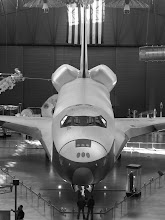President John F. Kennedy’s, May 25th, 1961 speech before Congress on the space effort, stands as one of the preeminent speeches on space. It is in this speech that a very specific goal is set before the country and the world, “I believe this nation should commit itself to achieving the goal before this decade is out of landing a man on the moon and returning him safely to the earth." These words sent out social and political shockwaves, and resonate to this day, as a bold vision for space unmatched by any American president since. Kennedy’s all or nothing message to Congress and the electorate was clear; space exploration was to be a bold and difficult undertaking, the cost high, and the rewards great, a commitment not to be made lightly. Yet, if the United States was to make this commitment, then it should be one that is resolute and unwavering, this endeavor is not to be abandoned. However, in recent years the American space program has foundered in the bureaucratic waters of Washington, D.C. and been all but forgotten by the public.
President George W. Bush’s Vision for Space Exploration was a ambitious step forward for NASA and the American program. Previous presidents announced their own grand plans for NASA. President George W. Bush's plan succeeded where others did not in two significant ways. First, two different Congresses (democratic and republican) appropriated funds, signifying their approval, of the Constellation moon program. Second, new hardware was actually designed, built, and tested. The policy was crafted with a specific goal, exploration, seeking to expand the horizon of human space flight, in ways not seen since the 1960’s. Apollo was a challenge that brought out the best American science and engineering had to offer, America needs such a challenge again.
President Obama hopes to inspire children during 2010 with a grand "Summer of Innovation" yet what will an aerospace career look like in ten or fifteen years? Will the commercial firms have returned independent launch capability to the United States? Will we still be buying seats aboard a Russian vehicle or yet a Chinese one? Given the four to eight year cycle of US space policy these are serious questions. Knowing that it has taken engineers six years (for the Bush Vision for Space Exploration) to proceed from an architecture to engineering schematics and on to hardware it is entirely possible that in four or eight years a new president will redirect NASA once again.
It is a shame that few know that their contribution to the NASA budget per week (in tax dollars) is less than what they personally spend on a single cup of coffee at their local coffee chain. For this relatively small investment, less than one-half percent of the federal budget, we have reached out into the stars, assembled an orbiting laboratory that is one of the great engineering achievements of the 20th and 21st centuries. Humans have had a continuous presence in space for ten years. It is ironic that a president who has voiced his desire to inspire future generations is pulling the rug out from under human space flight, one of if not the greatest examples of American ingenuity and creativity. To quote Casper Weinberger's famous (at least in space policy circles) memo to President Nixon, "to be sure we should reduce the budget but we should not make all our reduction decisions on the basis of what is reducible, rather than on the merits of individual programs...America should be able to afford something besides increased welfare and programs to repair our cities." We deserve a space program that demands we dream big dreams and challenges our ideas for what is possible. Great achievement knows no precise road map, but failure to invest in grand endeavors will surely be the end of the pioneering spirit that is part of our American identity.
“A Rough Road Leads to the Stars,” this may have never been truer. Space exploration is an ambitious and risky endeavor. To compromise our ambition and imagination as a result of politics is a tragedy for humankind. Former NASA Administrator Dan Goldin advocates, "a space program should never be about guaranteed routine operations. If fear drives us to set only mediocre goals, then even meeting those goals is a form of failure. Societal impact is the strongest when we continue to stretch our necks and imagination, searching for the loftiest goals, not when we look down at the bottom line.




No comments:
Post a Comment